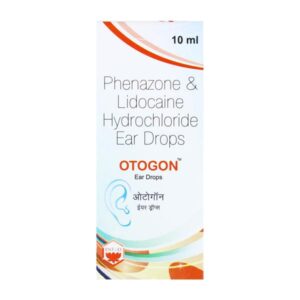LIDOCAINE (LIGNOCAINE OR XYLOCAINE) + PHENAZONE
Lidocaine (lignocaine Or Xylocaine): Lidocaine, also known as lignocaine or Xylocaine, is a medication commonly used as a local anesthetic and antiarrhythmic drug. It belongs to the class of amide local anesthetics.
Use:
Lidocaine is primarily used for local anesthesia to numb a small area of the body during medical procedures such as dental work, minor surgeries, or dermatological procedures. It can also be used for controlling pain and discomfort associated with conditions like hemorrhoids, sunburns, or insect bites. In addition to its local anesthetic properties, lidocaine is also used as an antiarrhythmic drug to treat abnormal heart rhythms.
Mechanism of Action:
Lidocaine works by blocking the voltage-gated sodium channels in nerve cells, thereby inhibiting the generation and conduction of nerve impulses. This action prevents the nerves from transmitting pain signals to the brain, resulting in local anesthesia. As an antiarrhythmic drug, lidocaine stabilizes the electrical activity in the heart, preventing abnormal heart rhythms.
Dose:
For local anesthesia, the specific dose and concentration of lidocaine depend on the procedure and the patient’s age and weight. It is typically administered as a topical cream, gel, or spray, or as an injection. The dose for antiarrhythmic use varies and is usually administered intravenously in a hospital setting under the supervision of a healthcare professional.
Side Effects:
Some common side effects of lidocaine include temporary numbness, tingling, or loss of sensation at the site of application. If used in excessively high doses or inadvertently injected into blood vessels, lidocaine can cause systemic side effects such as dizziness, lightheadedness, headache, blurred vision, tremors, and even seizures. Allergic reactions to lidocaine are rare but can occur and may present as skin rashes, itching, or swelling. It is important to inform your healthcare provider if you have any known allergies or sensitivities to similar medications.
It is essential to follow the prescribed dose and usage instructions for lidocaine to minimize the risk of side effects. Always consult with a healthcare professional before using lidocaine or any other medication.
Phenazone: Phenazone, commonly known as antipyrine, is a non-opioid analgesic drug that is primarily used to relieve pain and reduce fever. It belongs to the class of drugs called pyrazolones.
Mechanism of Action: Phenazone works by inhibiting the production of prostaglandins, which are responsible for inflammation and pain. It primarily acts by inhibiting the enzyme cyclooxygenase (COX), which is involved in the synthesis of prostaglandins.
Use: Phenazone is commonly used to provide short-term relief from mild to moderate pain, such as headache, toothache, menstrual cramps, and musculoskeletal pain. It is also used to lower fever in cases of various infections.
Dose: Phenazone is typically available in the form of oral tablets or liquid drops. The recommended dose for adults is usually 500 mg to 1 gram every 4 to 6 hours, not exceeding 4 grams per day. The dose may vary depending on the individual’s condition, age, and response to treatment. It is important to follow the dosage instructions provided by your healthcare provider or as mentioned on the medication label.
Side Effects: Like any medication, Phenazone can cause side effects. Common side effects include nausea, dizziness, headache, vomiting, and rash. It may also cause allergic reactions in some individuals, characterized by symptoms like itching, swelling, or difficulty in breathing. In rare cases, it may lead to serious side effects such as blood disorders or liver damage. If any severe side effects occur, it is essential to seek immediate medical attention.
Additionally, Phenazone can interact with other medications, including anticoagulants, antidepressants, and some antibiotics. It is crucial to inform your healthcare provider about all the medications you are taking to avoid potential drug interactions.
Overall, Phenazone is an effective analgesic and antipyretic medication. However, it is important to use it under medical supervision and follow the recommended dosage to minimize the risk of side effects or complications.

